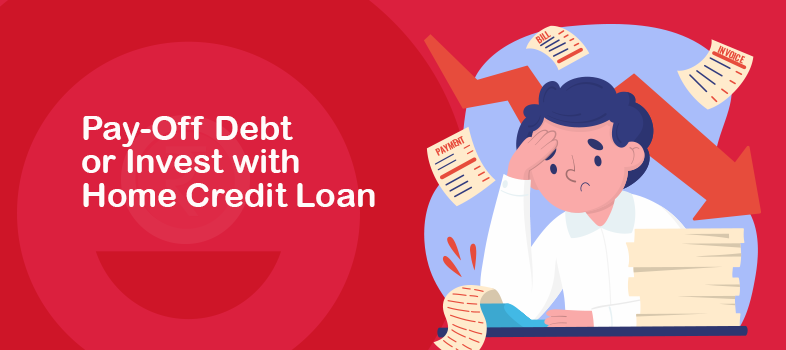Many of us face acute dilemma of putting money into the right streams- whether it’s about paying off existing debt or building investments of value. Of course, it’s not easy to make that decision, keeping in mind the source of money to be ploughed. Here, our Home Credit Personal Loan can really fit your shoes. Personal loan is easily available upto 2 lakhs at 0% processing fees and no hidden costs. Instant loans can be used to meet all purposes of an individual. Why is this decision so tough? This decision can either make your future or put a massive dent on your future plans. Before you solidify your decision, its best to conduct a proper research after taking the pros & cons into consideration & then take a final call.
Should You Pay Off Your Debt or Invest
Below highlighted steps can be taken to move in the right direction:
- Take a note of all debts – Its advised to list down the debts in an excel sheet or a piece of paper. Note down the existing debts, rate of interest & loan tenure. Indicate if any of the loans qualify for tax deduction. For example, if you have taken an education loan either for yourself or your spouse/child, the interest payable on it is eligible for tax deduction. The principle and interest amount in a home loan availed of are eligible for tax deduction. However, a home loan is a specific loan and cannot be dispensed for other important uses.
- Create an Emergency Fund –Check on your cash and bank balance. Understand if you have money to take care of emergencies, unforeseen situations like medical treatment, job lay-offs, lending an immediate hand etc. The amount should be equivalent to 3 to 6 months of your expenses depending on your lifestyle, family size, consumption, etc. If you do not have enough to set up an emergency fund, then use your earnings towards it, while choosing a personal loan to spend on planned expenditure.
- Compare & calculate interest rates – Check and compare the interest rates properly once. Generally, personal loans and credit card debts have higher interest rates and are consumption oriented. So, you can begin by paying off the higher interest loans. The interest could be eating into your savings account and you end up building more liabilities over assets by adding debts.
- Take your emotions under control– Yes, indeed it is important to consider your emotions. What would you like the most; staying debt free or investing money into assets which will reap benefits in the long term. If you are not a good saver, you have options to continue with EMI payments and strive hard to save. You should avoid taking risks considering your ability and tolerance levels. Introspect yourself well! Would it hurt you if the markets soar up suddenly & you wondered how nice would it have been understanding the stock markets a little. This could have doubled up your earnings & helped to pay off debt dents later. So, consider your personality and emotions before taking a decision. Here, an instant loan can truly help to pay off heavy duty loans & continue investing into stocks for good. On the contrary, it is better to pay off your debts which are costly to service. Paying off debts can save your current stream of money.
At the same time, it is important to invest in assets to generate returns and build wealth. You should use some of the surpluses to pay off loans like bigger loans and invest the remaining amount in assets that give optimum returns depending on your risk profile and financial goals.

